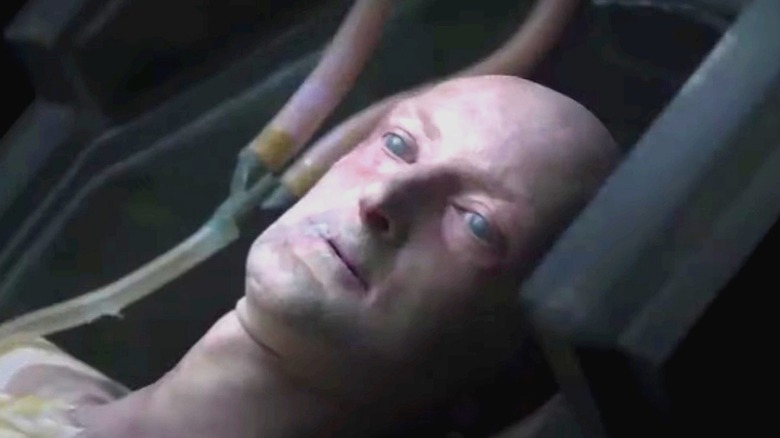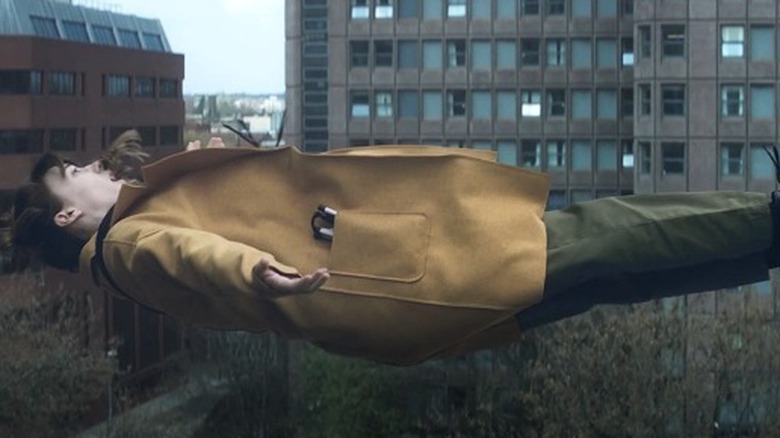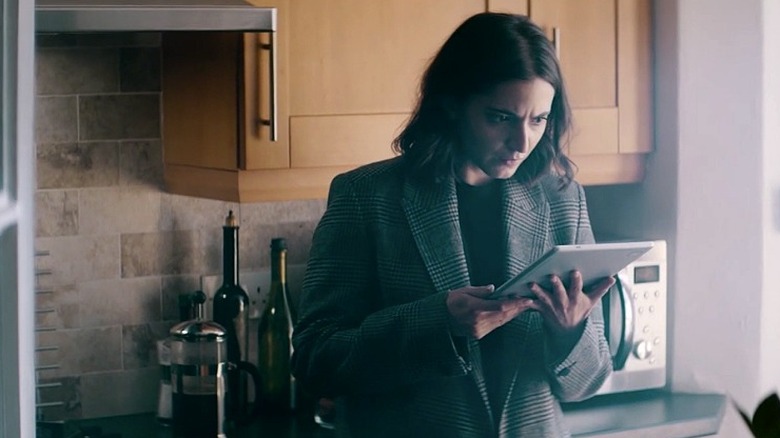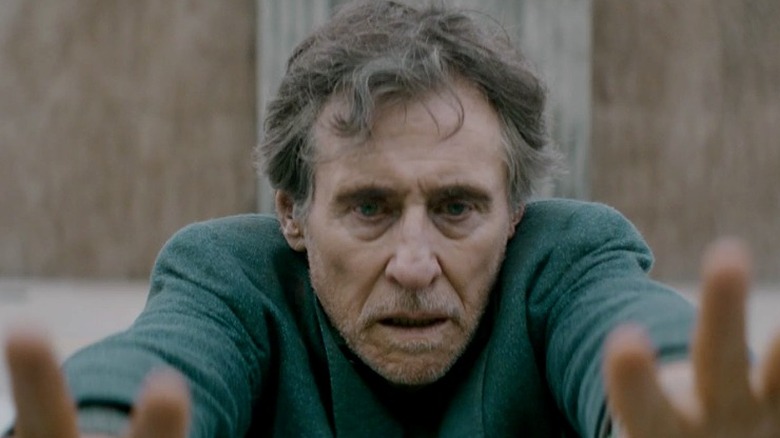The Ending Of War Of The Worlds Season 2 Explained
If Season 1 of the Epix series "War of the Worlds" ended on a cliffhanger, Season 2's finale pushed the narrative straight off the cliff — literally. In contrast to the slow-burn approach to Season 1 of "War of the Worlds," Season 2 kicked the story into an urgent fourth gear before leaping aggressively into fifth in its penultimate episode. Its finale, however, returned the series to the moodier, more existential narrative of its first eight episodes, putting a pin in the action while pivoting toward Season 3's potential thematic and narrative focal points.
In Season 2, viewers see the story's various pockets of survivors — including the pocket containing scientist Bill Ward, played by Gabriel Byrne ("Hereditary"), and potential alien Emily (Daisy Edgar-Jones) — finally locate one another and team-up to fight the alien invaders, who turn out to be a genetically deficient human population from the future. Emily returns from her time aboard the alien ship intermittently controlled by the alien's hyper brain, some darlings are killed off — Catherine's love interest Colonel Mokrani (Adel Bencherif), the always endearing Ash (Aaron Heffernan), and finally, Catherine (Léa Drucker) herself — and some major revelations occur.
What happened in Season 2 of War of the Worlds?
Most notably, Bill and the others learn (from a pair of ethical alien turncoats) that the aliens have traveled back through space and time to stop Bill from creating the virus that ultimately sickens and kills off their species. In other words, it's "The Terminator" meets "Independence Day," except that the species from another realm is neither robot nor alien, but human.
Season 2 blends a little Biblical allegory in as well, revealing that Emily and Sacha (Mathieu Torloting) share a connection to this future species because they created them — they're the "Adam and Eve" of this alien race. As is the case for essentially all time travel narratives, the humans decide one of them must travel back in time to "break the time loop" and prevent all this chaos from happening. While this approach has only ever gone smoothly in "Back to the Future," the finale at least suggests that Bill pulls it off by going back in time and pushing Emily off a building. To be fair, Emily also comes to the conclusion that she has to die, and attempts to kill herself aboard the alien ship so that her virus can't infect the others. The obsessed Sacha, however, doesn't let her do it.
Bill sacrifices himself in the process, knowing that he'll be convicted of murder, but will it work? Considering the series was renewed for a third season, it seems highly unlikely.
Season 2 leaves more questions than answers
Importantly, Bill is told by his future human cohort that when he wakes up back in time, hopefully whatever he has to do will be clear to him. Since he wakes up in the same hospital as Emily (who is there because she's still blind at this point, and having disturbing visions of what she doesn't yet know is the future) he decides he's meant to kill her. Apparently, despite the fact that Sacha is a straight-up, kitten-killing sociopath, it's Eve, not Adam, who must die in order to break the time loop. At least, that's how it's presented. And yet, as most audiences know by now, when it comes to time travel and preventing a future event, the self-sacrificing protagonist almost never gets it right on the first try.
We know from a news article in the Season 2 finale that Bill is arrested for Emily's murder, and that Emily (obviously) doesn't survive the plummet to her death. What we don't know is what becomes of the father of this alien race, Sacha, or if the virus will be created in some other way. We've also yet to meet the friend who designed Emily's tattoo, a figure only vaguely alluded to in Season 1. Since all the future humans bear the same tattoo, said friend could well be another time traveling alien. The finale also places Catherine back in her position at the lab (everyone who dies is brought back to life in the finale, because time travel), but it doesn't appear she receives any alien signal — the communique that kicked off Season 1. Finally, it's revealed that another of the survivors from the future — the obligatory bad ass Zoe (Pearl Chanda) — is having visions of the destructive events Bill supposedly prevents by killing Emily. In other words: we know these things are likely still going to happen. We just ... don't yet know how.
War of the Worlds' Season 2 finale pulls H.G. Wells into the present
When Wells wrote "The War of the Worlds" at the turn of the 20th century, there was an intentional irony in a narrative that saw the world's most powerful colonizer, Great Britain, invaded and nearly wiped out by a foreign species. In the original book, the aliens are ultimately defeated not by humans, but by their own lack of immunity to the various microbes on Earth. Overman's use of a biological weapon in "War of the Worlds" is a clear nod to its source material, and although the two versions contain few similarities, Season 2 reveals the series' sneaky modernization of Wells' critical intent.
As in the original, Epix "War of the Worlds" shows an invaded population at least partially responsible for its own invasion. These genetically deficient (and, importantly, unable to reproduce) future humans are nothing more than the result of our current populations' unethical scientific advances. Although Bill is only prompted to create the virus after the time traveling "aliens" attack earth, there's an understanding that the acclaimed neuroscientist will create this virus regardless (otherwise, why would the aliens have come back to begin with?). Either way, mankind is attacked as a result of its own actions.
That said, "War of the Worlds" reveals protagonists and antagonists on both sides of this epic battle, and pays homage to Wells' original (if subtler) implication that, in war, there are no good guys and bad guys — there are only two competing populations locked in a struggle for their own survival. By making the two species one and the same, Overman takes this theme a step further, turning it into a commentary on the ease with which our 21st century world still "others" our fellow human beings.



